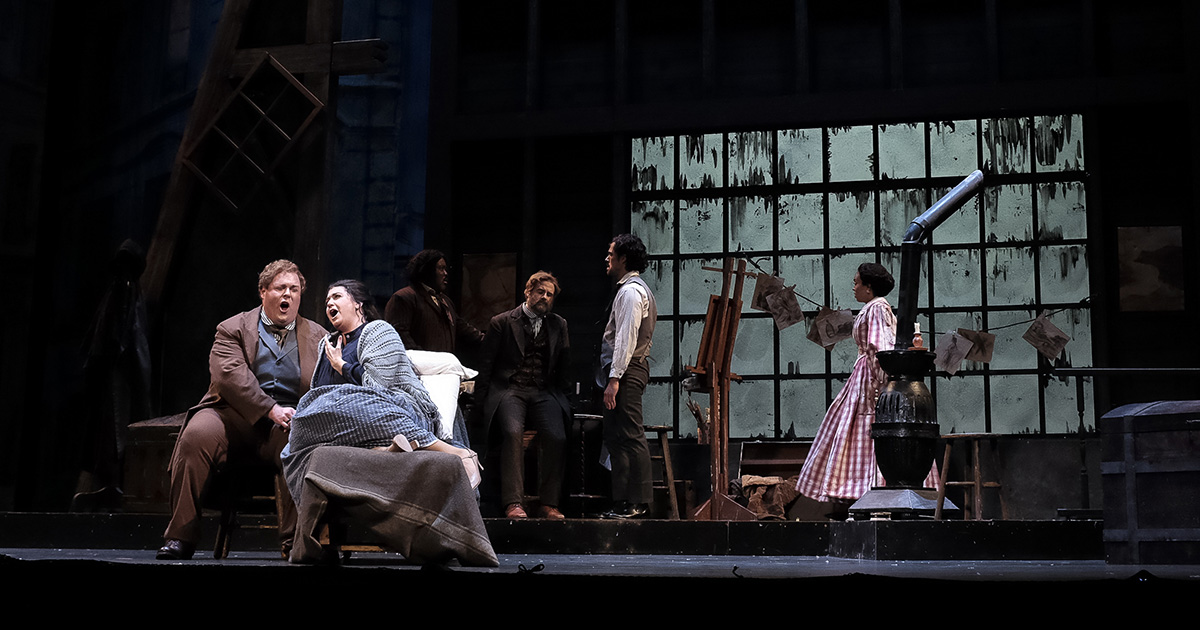According to those that count such things, Giacomo Puccini’s La Boheme is perennially in the top five of the “most produced” operas worldwide. Closer to home, Knoxville Opera’s own history suggests a similar calculation, the company having performed the work six times since 1982, with a seventh coming this past weekend at the Tennessee Theatre. Obviously, that kind of popularity carries a particular set of burdens, including the need to satisfy the musical and dramatic expectations of long-time opera-goers, as well as easing-in those who may be newbies exploring the art form for the first time. As it happens, one would be hard pressed to name an opera more appropriate than La Boheme for first-timers.
This deliciously romantic KO production, directed with his usual energy and cleverness by Dean Anthony, hit the heart of the work: the sadness of lost love. As the opening curtain rises on a gray, wintry Paris and the shabby garret of the four poor artists, we meet Rodolfo (tenor Ben Gulley), Marcello (baritone Luis Alejandro Orozco), Colline (bass-baritone Kevin Short), and Schaunard (baritone Scott Purcell). As the four resort to the expositional burning of Rodolfo’s latest play for warmth, the romantic duo of the opera becomes complete as the sadly doomed Mimi (soprano Rebecca Krynski Cox) stops by for a light for her candle, leading to them falling in love.
Gulley and Cox, both making their KO debuts, were perfectly paired, both vocally and in the important category of romantic chemistry. The Act I love duet “O soave fanciulla,” aided by the lush and soaring romantic orchestration (Knoxville Symphony Orchestra led by conductor Michelle Rofrano), is capable of softening the hardest of hearts, something the pair had no trouble doing with their commanding performances.

Rodolfo’s pal, Marcello, was sung with marvelous clarity – and given an impressive dramatic depth — by Luis Alejandro Orozco, who brought crisp definition to a role that often does not get the respect it deserves. Of course, Marcello is romantically frustrated by the cute, but flirtatious Musetta (Christine Lyons), a marvelously constructed character that takes great fun in teasing and taunting him. Her ultimate tease and statement of her feminine power is the opera’s most recognizable aria, Act II’s “Quando me’n vo’”, one that she offered up with satisfying bite and boldness.
In fact, Act II’s Cafe Momus street scene is the source for much of the opera’s contrast of comic gaiety to the tragedy of Mimi’s illness. Director Anthony pulled out all the stops here in this staging, tossing the Musetta subplot into a visual salad of atmospheric street antics with toy vendor Parpignol (Jackson Guthrie) and the delightful Children’s Chorus. Sometimes, though, “more” is too much; the stage picture was so crowded and busy with the principals, the KO chorus, and children, that the scene of Musetta’s comic abuse of her wealthy admirer, Alcindoro (Jason Hardy), was almost obscured by the energetic goings-on.
Anthony took a simple approach to the Act IV death scene, a scene that is deceptively difficult to pull off, making sense of the involvement in the garret room of Marcello, Colline, Schaunard, and Musetta, at the same time giving focus to the heartbreaking poignance of Mimi and Rodolfo.
Conductor Rofrano, also making a KO debut, led the KSO in painting the romantic push and pull with eloquent washes of melodramatic strings and winds; her perfectly dictated tempos kept the narrative energy alive. The excellent chorus of Act II Parisians and parade participants was under the direction of Christy Lee. The Children’s Chorus, yet another source of bright and sparkling stage energy, was directed by Amanda Fintak.
Knoxville Opera will continue its season in May with the contemporary opera Stuck Elevator, music by Byron Au Yong and libretto by Aaron Jafferis, presented in collaboration with River & Rail Theatre Company.





